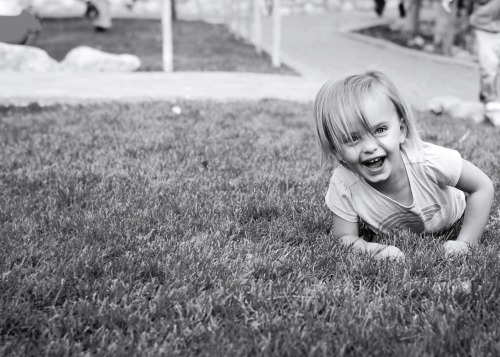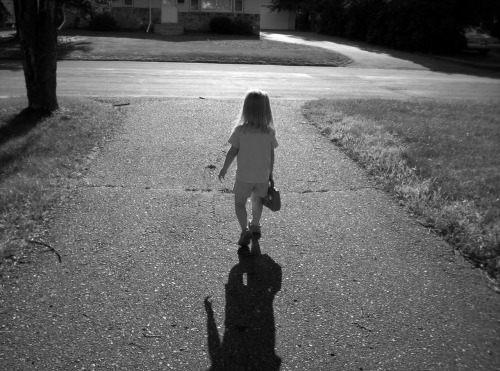I am writing this to plead with Christian parents to require obedience of their children. I am moved to write this by watching young children pay no attention to their parents’ requests, with no consequences. Parents tell a child two or three times to sit or stop and come or go, and after the third disobedience, they laughingly bribe the child. This may or may not get the behavior desired.
Last week, I saw two things that prompted this article. One was the killing of 13-year-old Andy Lopez in Santa Rosa, California, by police who thought he was about to shoot them with an assault rifle. It was a toy gun. What made this relevant was that the police said they told the boy two times to drop the gun. Instead he turned it on them. They fired.
I do not know the details of that situation or if Andy even heard the commands. So I can’t say for sure he was insubordinate. So my point here is not about young Lopez himself. It’s about a “what if.” What if he heard the police, and simply defied what they said? If that is true, it cost him his life. Such would be the price of disobeying proper authority.
A Tragedy in the Making
I witnessed such a scenario in the making on a plane last week. I watched a mother preparing her son to be shot.
I was sitting behind her and her son, who may have been seven years old. He was playing on his digital tablet. The flight attendant announced that all electronic devices should be turned off for take off. He didn’t turn it off. The mother didn’t require it. As the flight attendant walked by, she said he needed to turn it off and kept moving. He didn’t do it. The mother didn’t require it.
One last time, the flight attendant stood over them and said that the boy would need to give the device to his mother. He turned it off. When the flight attendant took her seat, the boy turned his device back on, and kept it on through the take off. The mother did nothing. I thought to myself, she is training him to be shot by police.
Rescue from Foolish Parenting
The defiance and laziness of unbelieving parents I can understand. I have biblical categories of the behavior of the spiritually blind. But the neglect of Christian parents perplexes me. What is behind the failure to require and receive obedience? I’m not sure. But it may be that these nine observations will help rescue some parents from the folly of laissez-faire parenting.
1. Requiring obedience of children is implicit in the biblical requirement that children obey their parents.
“Children, obey your parents in the Lord, for this is right” (Ephesians 6:1). It makes no sense that God would require children to obey parents and yet not require parents to require obedience from the children. It is part of our job — to teach children the glory of a happy, submissive spirit to authorities that God has put in place. Parents represent God to small children, and it is deadly to train children to ignore the commands of God.
2. Obedience is a new-covenant, gospel category.
Obedience is not merely a “legal” category. It is a gospel category. Paul said that his gospel aim was “to bring about the obedience of faith” (Romans 1:5). He said, “I will not venture to speak of anything except what Christ has accomplished through me to bring the Gentiles to obedience — by word and deed” (Romans 15:18).
Paul’s aim was “to take every thought captive to obey Christ” (2 Corinthians 10:5). He required it of the churches: “If anyone does not obey what we say in this letter, take note of that person, and have nothing to do with him” (2 Thessalonians 3:14).
Parents who do not teach their children to obey God’s appointed authorities prepare them for a life out of step with God’s word — a life out of step with the very gospel they desire to emphasize.
(If anyone doubts how crucial this doctrine is, please consider reading Wayne Grudem’s chapter, “Pleasing God by Our Obedience: A Neglected New Testament Teaching” in For the Fame of God’s Name, edited by Justin Taylor and Sam Storms.)
3. Requiring obedience of children is possible.
To watch parents act as if they are helpless in the presence of disobedient children is pitiful. God requires that children obey because it is possible for parents to require obedience. Little children, under a year old, can be shown effectively what they may not touch, bite, pull, poke, spit out, or shriek about. You are bigger than they are. Use your size to save them for joy, not sentence them to selfishness.
4. Requiring obedience should be practiced at home on inconsequential things so that it is possible in public on consequential things.
One explanation why children are out of control in public is that they have not been taught to obey at home. One reason for this is that many things at home don’t seem worth the battle. It’s easier to do it ourselves than to take the time and effort to deal with a child’s unwillingness to do it. But this simply trains children that obedience anywhere is optional. Consistency in requiring obedience at home will help your children be enjoyable in public.
5. It takes effort to require obedience, and it is worth it.
If you tell a child to stay in bed and he gets up anyway, it is simply easier to say, go back to bed, than to get up and deal with the disobedience. Parents are tired. I sympathize. For more than 40 years, I’ve had children under eighteen. Requiring obedience takes energy, both physically and emotionally. It is easier simply to let the children have their way.
The result? Uncontrollable children when it matters. They have learned how to work the angles. Mommy is powerless, and daddy is a patsy. They can read when you are about to explode. So they defy your words just short of that. This bears sour fruit for everyone. But the work it takes to be immediately consistent with every disobedience bears sweet fruit for parents, children, and others.
6. You can break the multi-generational dysfunction.
One reason parents don’t require discipline is they have never seen it done. They come from homes that had two modes: passivity and anger. They know they don’t want to parent in anger. The only alternative they know is passivity. There is good news: this can change. Parents can learn from the Bible and from wise people what is possible, what is commanded, what is wise, and how to do it in a spirit that is patient, firm, loving, and grounded in the gospel.
7. Gracious parenting leads children from external compliance to joyful willingness.
Children need to obey before they can process obedience through faith. When faith comes, the obedience which they have learned from fear and reward and respect will become the natural expression of faith. Not to require obedience before faith is folly. It’s not loving in the long run. It cuts deep furrows of disobedient habits that faith must then not infuse, but overcome.
8. Children whose parents require obedience are happier.
Laissez-faire parenting does not produce gracious, humble children. It produces brats. They are neither fun to be around, nor happy themselves. They are demanding and insolent. Their “freedom” is not a blessing to them or others. They are free the way a boat without a rudder is free. They are the victims of their whims. Sooner or later, these whims will be crossed. That spells misery. Or, even a deadly encounter with the police.
9. Requiring obedience is not the same as requiring perfection.
Since parents represent God to children — especially before they can know God through faith in the gospel — we show them both justice and mercy. Not every disobedience is punished. Some are noted, reproved, and passed over. There is no precise manual for this mixture. Children should learn from our parenting that the God of the gospel is a consuming fire (Hebrews 12:7, 29) and that he is patient and slow to anger (1 Timothy 1:16). In both cases — discipline and patience — the aim is quick, happy, thorough obedience. That’s what knowing God in Christ produces.
Parents, you can do this. It is a hard season. I’ve spent more than sixty percent of my life in it. But there is divine grace for this, and you will be richly rewarded.




































